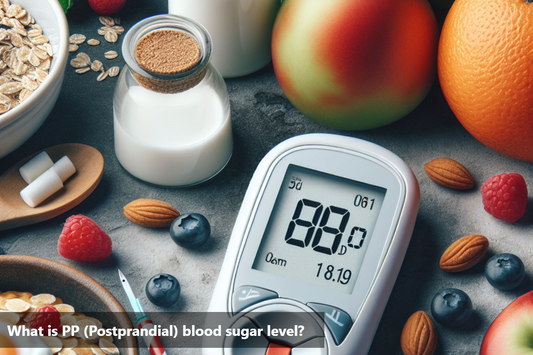Carbohydrates are essential for energy, especially during high-intensity activities. They come in three main types: sugars, starches, and fiber. Sugars can be found in fruits, vegetables, and dairy products, while starches are abundant in grains, legumes, and starchy vegetables. Fiber is present in fruits, vegetables, whole grains, and legumes. Carbohydrates are broken down into glucose for energy and also support the central nervous system. Understanding carbohydrate sources helps make healthier dietary choices.
- According to current guidelines, 45–65% of a person’s daily calories should come from carbohydrates, which is equal to about 225 to 325 grams of carbs if you eat 2,000 calories a day.
Understanding Daily Carbohydrate Needs
-
Total Daily Calorie Requirement: Your overall caloric needs are a crucial factor in calculating your carbohydrate intake.
-
Macronutrient Ratios: Balancing the proportion of macronutrients in your diet, with the general recommendation being for carbohydrates to comprise 45-65% of your total caloric intake.
-
Individual Goals: Consider how your individual goals, such as weight loss or muscle gain, impact your carbohydrate intake. For weight loss, a moderate reduction in carbohydrate intake might be beneficial, whereas athletes and bodybuilders may require a higher carbohydrate intake to support their physical activities and muscle growth.
-
Personal Health and Fitness Objectives: Be mindful of your personal objectives to ensure that your carbohydrate intake aligns with your overall health and fitness goals.
Functions of Carbohydrates
-
Energy Source: Carbohydrates are the primary source of energy for the body, particularly for tissues like the brain and muscles. They are efficiently converted into glucose, which cells use for energy production through processes like glycolysis and cellular respiration.
-
Fuel for the Brain: Glucose derived from carbohydrates is crucial for brain function. The brain relies heavily on glucose for energy, and insufficient carbohydrate intake can impair cognitive function.
-
Support for Physical Activity: Carbohydrates provide readily available energy for physical activity and exercise. They are stored in muscles and liver as glycogen, which can be quickly broken down into glucose to meet increased energy demands during exercise.
-
Protein Sparing: Adequate carbohydrate intake spares protein from being used as an energy source. This allows proteins to fulfill their primary roles in building and repairing tissues, synthesizing enzymes and hormones, and maintaining immune function.
-
Regulation of Blood Glucose: Complex carbohydrates, such as fiber-rich foods, help regulate blood glucose levels by slowing down the absorption of sugars into the bloodstream. This helps prevent rapid spikes and crashes in blood sugar levels.
-
Digestive Health: Dietary fiber, a type of carbohydrate, supports digestive health by promoting regular bowel movements, preventing constipation, and supporting the growth of beneficial gut bacteria.
-
Vitamins and Minerals: Many carbohydrate-rich foods, such as fruits, vegetables, and whole grains, are also rich sources of essential vitamins (e.g., vitamin C, folate) and minerals (e.g., potassium, magnesium), which are vital for overall health and wellbeing.
Balancing Carbohydrates with Other Nutrients
-
Include Protein with Each Meal: It's essential to incorporate protein into every meal as it supports muscle growth, aids in weight management and strengthens the immune system. Opt for lean protein sources such as chicken, turkey, tofu, and legumes.
-
Incorporate Healthy Fats: Introducing healthy fats from sources like avocados, nuts, and olive oil into your diet can promote satiety and contribute to heart health.
-
Choose Complex Carbs: While some people associate carb consumption with weight gain, it's important to differentiate between refined and complex carbs. Whole grains and vegetables provide sustained energy and essential nutrients, benefiting digestion and overall health.
-
Balanced Diet for Overall Health: Balancing the intake of carbs, protein, and fats is crucial for maintaining overall health. Understanding the significance of these nutrients and making informed food choices are essential for a healthy diet. Plan your meals to include moderate amounts of each type of food to achieve optimal health.
Risks of Cutting Carbs
When cutting carbs from your diet, it's important to be aware of the potential risks involved. Some of the risks of reducing carb intake include:
-
Nutrient deficiencies: Carbohydrates are a major source of essential nutrients such as fiber, vitamins, and minerals. Drastically reducing carb intake can lead to deficiencies in these important nutrients.
-
Low energy levels: Carbohydrates are the body's primary source of energy. Cutting carbs too much can result in low energy levels, making it difficult to carry out daily activities and exercise.
-
Increased risk of certain health conditions: Research suggests that extremely low-carb diets may be linked to an increased risk of heart disease, diabetes, and other health conditions.
-
Negative impact on mental health: Some people may experience mood swings, irritability, and difficulty concentrating when they drastically reduce their intake of carbohydrates.
It's important to consult with a healthcare professional or a registered dietitian before making significant changes to your carbohydrate intake to minimize these risks and ensure a balanced, healthy diet.
To conclude:
As we conclude our discussion on carbs, it's important to highlight the key points. Your carb needs depend on factors like age, gender, activity level, and overall health. A well-balanced diet should consider the source and type of carbs, as well as protein and fat intake. Instead of viewing carbs as the enemy in weight management, focus on consuming carbs from whole grains, fruits, and vegetables as part of a balanced diet. For personalized advice, consult a healthcare professional or nutritionist to determine your daily carb intake suited to your needs and goals, whether it's losing weight, gaining muscle, or improving overall health. Monitoring carb intake and understanding different carb types, while balancing them with essential nutrients, can contribute to a healthy and fulfilling life. Even small dietary changes can significantly impact overall health.
FAQs:
-
Q: What is the recommended daily carb intake? A: The recommended daily carb intake varies depending on factors such as age, activity level, and overall health. However, a general guideline is to consume 45-65% of your daily calories from carbohydrates.
-
Q: Can I still lose weight while consuming a moderate amount of carbs? A: Yes, it is possible to lose weight while consuming a moderate amount of carbs. The key is to focus on consuming complex carbs such as whole grains, fruits, and vegetables, and to monitor portion sizes.
-
Q: Are there specific carb requirements for athletes and active individuals? A: Athletes and active individuals may require a higher daily carb intake to fuel their training and performance. It's important for them to work with a nutritionist or dietitian to determine their specific carb needs.
-
Q: How do carbs impact blood sugar levels? A: Carbs have the most direct and immediate impact on blood sugar levels. Eating a moderate amount of carbs, especially those with a low glycemic index, can help maintain stable blood sugar levels.
-
Q: Can consuming too many carbs lead to health issues? A: Consuming an excessive amount of simple carbs, sugary foods, and refined grains can lead to health issues such as weight gain, insulin resistance, and an increased risk of developing chronic diseases. It's important to focus on consuming quality carbs in moderation.
This Blog post is an initiative by DiabeSmart, to provide accurate and Nutritionist / Doctor approved information related to Diabetes. DiabeSmart is India's first Food brand designed specifically for Diabetics, that has been clinically tested on Diabetics and Pre-Diabetics to deliver 55% - 70% lower Sugar spikes. DiabeSmart is part of Lo! Foods - India's leading brand for Everyday Functional Health foods.













